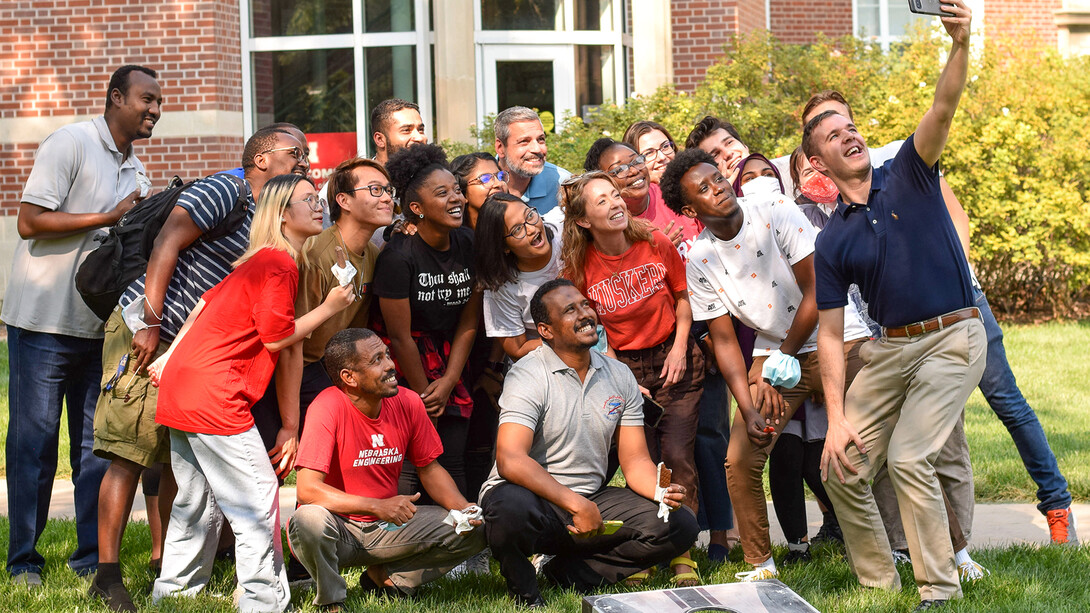
As the University of Nebraska–Lincoln moves forward with diversity planning and a new commitment to action, Nebraska Today is sitting down with university leaders to explore how inclusive excellence is being folded into day-to-day campus activities.
Since 2019, the university’s Office of Diversity and Inclusion has worked directly with institutional leaders in multiple ways, including through the Council of Inclusive Excellence and Diversity. Intended to connect colleges, primary campus units and ODI, the council is led by Nkenge Friday, assistant vice chancellor for strategic initiatives, with representation from across the institution.
The work of the council has been pivotal in guiding diversity, equity and inclusion plans university-wide. And, momentum realized through the council is being featured in this Q&A series.
Today, we’re continuing the series with Global Affairs, talking with Marnie Nelson, associate director of Education Abroad; and Erika Hepburn, interim assistant director of the International Student and Scholar Office. Nelson and Hepburn also serve as co-chairs of the Global Nebraska Coalition on Diversity and Inclusion.
What is the state of diversity, equity and inclusion planning in your college/department/unit?
Global Affairs — which includes the Office of Global Strategies, Education Abroad Office, International Student and Scholar Office and Programs in English as a Second Language — understands that our global community and campus internationalization efforts are an important part of DEI work at our institution. We have been working closely with the Office of Diversity and Inclusion as we increase our support and resources for international students, scholars and faculty and ensure that we include the voices of these communities in our planning efforts. The crafting of the first-ever global strategy for the university, Forward Together, outlines these goals to continue our partnership and work with the Office of Diversity and Inclusion. To meet the DEI goals outlined in our global strategy and serve as better partners to the Office of Diversity and Inclusion, we have also established the Global Nebraska Coalition on Diversity and Inclusion.
Are elements of your DEI planning already being implemented?
Yes, last September we established the Global Nebraska Coalition on Diversity and Inclusion and launched a website that lists our events and members. The coalition partners with units across campus to bring lectures, volunteer opportunities, professional development sessions and a space for voices from our units to be heard and raised to leadership. Some of these initiatives include hosting three DEI-related book clubs, a series of guest lectures examining diversity movements from around the world and partnering with UPC Nebraska to host a presentation by Paul Gorski last April. The coalition and each Global Affairs unit have also developed a DEI mission statement and specific goals, which they have begun implementing over the last six months.
How are individuals within your college/department/unit helping advance inclusive excellence?
We believe that we are not successful if our international students, scholars and faculty voices are not elevated and set up for success. In the development of our global strategy, Forward Together, we included a committee of diverse faculty to guide us in its creation and implementation process. We also leaned heavily on international student and scholar focus groups and surveying over the last couple of years to ensure their stories, guidance and first-hand experiences are taken into account as we develop new support structures for them at Nebraska.
Many staff members across Global Nebraska Coalition on Diversity and Inclusion and Global Affairs have also played a lead role in expanding International Education Week into a month-long observance this year, planning and supporting more than 80 events hosted for the university’s largest International Education Week celebration ever. The event helps advance inclusive excellence at Nebraska by promoting global experiential learning opportunities and celebrating cultural exchange.
Is there a part of the plan that is most exciting to you and/or having a positive impact on your college/department/unit?
Recently, the Education Abroad Office has focused on creating global experiences that take place not only overseas, but also virtually and domestically, thus making cross-cultural experiences accessible to more students. This is an exciting chance to increase innovative experiential learning opportunities for students — opportunities that allow us to bring on more campus partners. One of these Global Experience courses, “Negotiating Peace: From Conflict to Coexistence,” just received the Award for Excellence in Education Abroad Curriculum Design from the Forum on Education Abroad. The course was created this summer and co-taught by Kate Kunzman, education abroad coordinator, and Emira Ibrahimpasic, assistant professor of practice and assistant director of the Global Studies program.
Earlier this week, Josh Davis, associate vice chancellor for global affairs, also announced increased staffing and support in International Student and Scholar Office to enhance programming and support infrastructure for our international students and scholars. Global Affairs has also begun collaborating with the International Student Advisory Board, a recognized student organization that aims to uplift and amplify the voices of international students, to implement feedback gathered from recent student listening sessions hosted by the board. These suggestions include more day-to-day advising options and support for our international students and scholars; creating a more inclusive environment in classrooms by ensuring faculty and domestic students are prepared to engage with our international students; and collaborating with units across campus, such as Graduate Studies and Career Services, to prepare graduate and other students for their careers.







